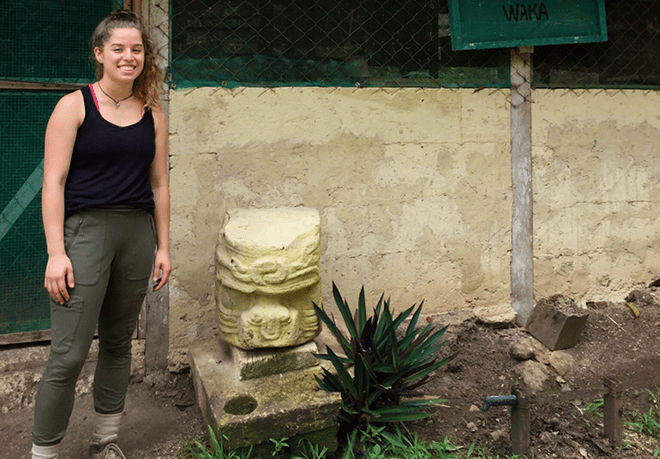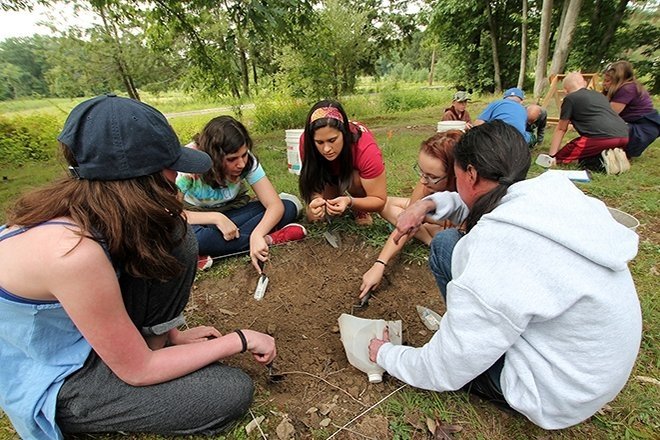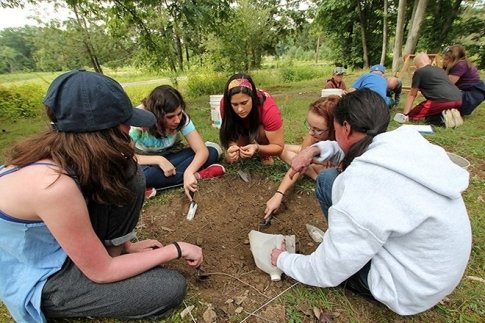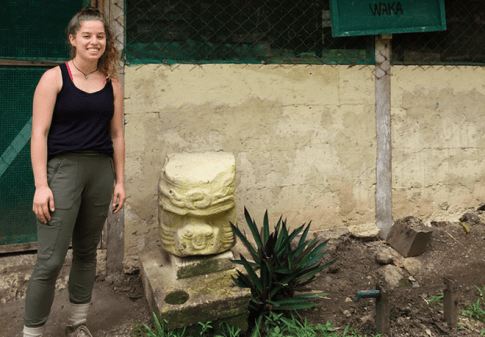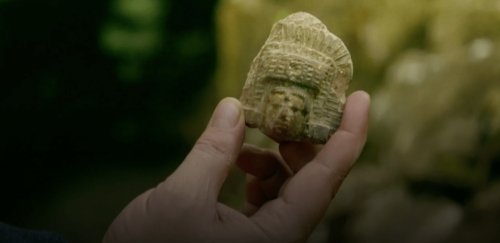
Anthropology
Anthropology studies the whole of the human condition and experience: our past, present, and future. Similar to other sciences, anthropology is concerned with the formulation of explanations of observed human phenomena. Particularly interested in diversity, anthropologists study culture, society, language, and biology across a broad range of human cultures, giving it a uniquely comparative and holistic perspective.
- Degrees & Offerings
-
- B.A.
- Location
-
- Bloomsburg
- Lock Haven
- Mansfield
- Program Contact
-
Chair of the Department of Anthropology, Sociology, Criminal Justice, and Social Work / Associate Professor of Criminal Justice
Notice: We are no longer accepting applications under Anthropology. Please consider a related major, such as Criminal Justice, Languages and Cultures, Sociology, or another major in the College of Arts, Humanities, Education, and Social Sciences.
Why Study Anthropology?
Here at Commonwealth University, you'll find anthropology divided into three study areas:
- Cultural anthropology, which studies ways of life in societies across the world;
- Biological anthropology, which traces human origins and biological variability;
- Prehistoric archaeology, which seeks to explain human behavior by studying material remains from past cultures.
You’ll take courses in cultural anthropology, prehistoric archaeology, biological anthropology, history of anthropology, and research and writing skills. You will choose from classes in field archaeology, ethnographic field methods, an independent study, or an internship. We emphasize a strong foundation in the major subfields of anthropology: cultural anthropology, biological anthropology, and archaeology. Our program is structured to both introduce you to the anthropology field, as well as allow you to conduct original research on your specific interests within anthropology.
Commonwealth University's anthropology program is designed to provide majors with two different educational experiences. The program will give pre-professional training for those students who wish to pursue graduate study in anthropology, and a good liberal arts background to those students who are not interested in a graduate education.
To date, the anthropology program has been very successful in meeting these goals. CU students have successfully entered and participated in quality graduate programs in anthropology, while other anthropology majors have been able to obtain rewarding employment with a B.A. degree, usually in a Diversity, Equity, and Inclusion (DEI) or social service areas. The anthropology faculty are prepared to provide vocational guidance and tailor an anthropology curriculum to best meet the needs of each individual student. By selecting anthropology as a major, a student has not limited their career options, but has only begun to explore a range of vocational opportunities.
Course Delivery Format
Bloomsburg
Face-to-Face
Online
Hybrid
Lock Haven
Face-to-Face
Online
Hybrid
Mansfield
Face-to-Face
Online
Hybrid
Clearfield
Face-to-Face
Online
Hybrid
Courses and Curriculum
Resources for Anthropology Students
Graduate Studies
Your studies add up to allowing you to precisely tailor an anthropology program for your personal career goals and interests. This curriculum is designed to prepare you for admission to graduate school in anthropology. Each year, approximately one-third of the seniors majoring in anthropology apply to graduate school, with 90 percent accepted at their first-choice institution. Previous students have been accepted to:
- Marquette University (MEd in Student Affairs)
- University of Colorado (MA in Medical Anthropology)
- City College of London (Bio Anthropology)
- University of Edinburgh (Bio/Archaeology)
- Brandeis University (MA Archaeology)
- University of Scranton (MA Spanish)
and more!
Clubs and Organizations
Anthropology Club (Bloomsburg, virtual options available for other campuses)
- Membership is open to any student interested in anthropology. There are no club dues. The club meets bi-weekly and sponsors programs of all kinds. In the past, the club has sponsored a tour of the Olmec exhibit at Princeton University, talks and presentations by several faculty, the annual Fall Festival, participation in Native American Pow Wows, and student attendance at the American Anthropological Association's Annual Meeting and the PASSHE Undergraduate Anthropology Conferences. The club also sponsors an annual T-shirt competition to determine the design for each year's club shirt.
Contact: Damien Marken, dmarken@commonwealthu.edu
Honor Societies
- Beginning in 1996, the Bloomsburg's anthropology department became a member of Lambda Alpha, the national honorary society for anthropology students. Anthropology students become eligible for membership when they achieve junior status with at least 12 credits in anthropology and maintain a minimum of a 3.2 GPA in their anthropology classes. Students elected to the honors society pay a one-time due of $25, which entitles them to a membership certificate and a one-year subscription to the society's newsletter.
Lambda Alpha sponsors a nationwide scholarship competition each year for students who would like to attend graduate school. There is an awards luncheon hosted by the anthropology department to honor Bloomsburg Lambda Alpha students and the Anthropology Student of the Year at the end of the spring semester each year.
Contact: Susan Dauria, sdauria@commonwealthu.edu
Center for Community Research and Consulting
- Bloomsburg's Center for Community Research and Consulting (CCRC) features a dedicated team of faculty and students who collaborate to improve the community through internship opportunities, research, and professional development.
Contact: Susan Dauria, sdauria@commonwealthu.edu
Professional Preparation
- Field Schools and Internships with the American Anthropological Association Resources eAnthroGuide - Locate internships and field school opportunities across many specializations, like archaeology and medical anthropology.
- Visit the AAA’s website for a directory of detailed listings for over 60 field schools that includes contact information. For student members of the AAA, view full listings of the eAnthroGuide including research details for 10,000 current members and more than 80,000 anthropological experts.
- Fellowships and Support - Find information on grants, scholarships, and fellowships for undergraduate and graduate students on the AAA’s website.
- Waka’ Archaeological Project (PAW) – CU students can travel to the ancestral Maya site of El Perú-Waka’ to conduct archaeological field and lab research with Dr. Damien Marken and his colleagues.
- The Bloomsburg Children’s Museum – Student interns learn basic skills in museum curation and have the opportunity to develop museum programs tailored to educating children.
- Fair Stories, Oral Histories of the Bloomsburg Fair – Students collect oral histories from fair goers under the supervision of Dr. Susan Dauria.
- PA Historical & Museum Commission Keystone Summer Internship Program - Designed to provide preprofessional training to students interested in pursuing a career in history, historic preservation, or museums. Each Keystone Summer Intern will work directly with a Pennsylvania Historical & Museum Commission (PHMC) staff mentor on a specific project or projects and will also learn about PHMC's multiple functions though educational and networking opportunities.
- Bloomsburg Township Police Department Internships – For students interested in forensic science and policing.
- Career Paths and Education - Read a brief overview of the benefits of an anthropological education and career prospects on the AAA website.
- What Can I Do With This Major? - View this great career resource for undergraduate and graduate students with practical information and strategies for pursuing diverse career paths with an anthropology or archaeology degree.
- Bureau of Labor Statistics - Read the entry on anthropologists and archaeologists in the Bureau of Labor Statistic’s online Occupational Outlook Handbook. Resources for Students Interested in Practicing/Applied Careers Anthropologists on the Job Market: How Departments and Job
- A Career in Practice Webinar - Watch Riall Nolan discuss professional development and career building for anthropologists outside of the academy in this archived AAA webinar. Nolan covers resume writing, job search tips, interviewing, and more.
- Versatile PhD - Prepare for a non-academic career by exploring career paths, viewing job listings, connecting with an online community, and discovering networking opportunities and resources.
- The Professor Is In - Find resources on academic career paths, tenure, and hiring. Employment services are also offered for a fee.
Strong Curriculum
Customize your education and create additional career options through a selection of minors and concentrations.
- Geography
- History
- Languages and Cultures
- Legal Studies
- Media and Journalism
- Political Science
- Social Work
- Sociology
The Commonwealth Difference
Careers
Our Anthropology program prepares you for a wide array of career opportunities.
Potential Job Opportunities
- Advertising, Marketing and Business Management
- Cultural Resources Management and Archaeology
- Forensic Anthropology (Crime Lab)
- Diversity, Equity, and Inclusion
- Health Care
- Urban Planning
- Museum Curator
- Economic and Cultural Development
- Social Work and Counseling
- Environmental Conservation, Park Services, and Forestry
- Attorney
- Epidemiologist
- Journalist
- Medical Anthropologist
- Mental Health Counselor
- Policy Analyst
Program Contacts
Applying to This Program
Apply
-
Application Process
Review the step-by-step process whether you're a first-year student, transferring to CU, or more.
-
Apply Now
By starting your application, you gain access to your personalized application portal to view your progress.
-
Scholarships
As the largest comprehensive university in north central and northeastern Pennsylvania, CommonwealthU works hard to provide a world-class education that consistently rates among the best values in the nation.
Explore More
-
Explore Commonwealth University
There's no better way to learn more than to experience Commonwealth University for yourself! Set up a campus tour or connect with us virtually.
-
Connect with Your Admissions Counselor
Applying to college is a big step. You have questions, and we have answers!
-
Understanding Financial Aid
Financial Aid can be a complex topic. Our Financial Aid team is here to tell you what you need to know and help you navigate the financial aid process.

